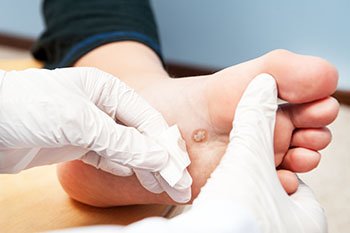
Warts on the skin are caused by coming in contact with a virus called the human papillomavirus, or HPV. Plantar warts are a specific type of wart that grows on the bottom of the foot. A plantar wart may start as a small round area of tough skin but may increase in size. Tiny clogged blood vessels that appear as small black dots may appear on the site of the wart. It may take as long as six months for a wart to appear after the foot is exposed to the virus. A podiatrist can examine the plantar wart and determine the best treatment options, which may include cryotherapy by liquid nitrogen, which is generally used on adults or older children. Other methods of treatment involve scraping the wart off the foot, injections of antiviral medication, and laser therapy. Treatment for plantar warts varies and unfortunately, warts can come back even after treatment is completed. If you have a plantar wart that is growing very quickly, or one that is bleeding or appears to be infected, it is strongly suggested that you seek help from a podiatrist, who is specially trained to deal with foot problems.
Plantar warts can be very uncomfortable. If you need your feet checked, contact Frederick Matthews, DPM from Innovative Foot and Ankle Care. Our doctor will assist you with all of your foot and ankle needs.
About Plantar Warts
Plantar warts are the result of HPV, or human papillomavirus, getting into open wounds on the feet. They are mostly found on the heels or balls of the feet.
While plantar warts are generally harmless, those experiencing excessive pain or those suffering from diabetes or a compromised immune system require immediate medical care. Plantar warts are easily diagnosed, usually through scraping off a bit of rough skin or by getting a biopsy.
Symptoms
- Lesions on the bottom of your feet, usually rough and grainy
- Hard or thick callused spots
- Wart seeds, which are small clotted blood vessels that look like little black spots
- Pain, discomfort, or tenderness of your feet when walking or standing
Treatment
- Freezing
- Electric tool removal
- Laser Treatment
- Topical Creams (prescription only)
- Over-the-counter medications
To help prevent developing plantar warts, avoid walking barefoot over abrasive surfaces that can cause cuts or wounds for HPV to get into. Avoiding direct contact with other warts, as well as not picking or rubbing existing warts, can help prevent the further spread of plantar warts. However, if you think you have developed plantar warts, speak to your podiatrist. He or she can diagnose the warts on your feet and recommend the appropriate treatment options.
If you have any questions please feel free to contact our office located in Plano, TX . We offer the newest diagnostic and treatment technologies for all your foot and ankle needs.
